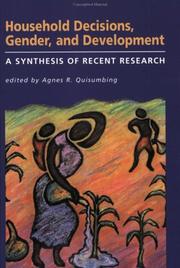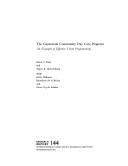| Listing 1 - 10 of 11 | << page >> |
Sort by
|

ISBN: 0896297179 9780896297173 Year: 2003 Publisher: Washington, D.C. International Food Policy Research Institute
Abstract | Keywords | Export | Availability | Bookmark
 Loading...
Loading...Choose an application
- Reference Manager
- EndNote
- RefWorks (Direct export to RefWorks)
339.96 --- 339.96 Ontwikkelingshulp. Ontwikkelingssamenwerking. Ontwikkelingsproblematiek --- Ontwikkelingshulp. Ontwikkelingssamenwerking. Ontwikkelingsproblematiek --- Sociology of the family. Sociology of sexuality --- National wealth --- National consumption --- Developing countries: agricultural and food problems --- Developing countries
Book
Year: 2006 Publisher: Washington IFPRI (International Food Policy Research Institute)
Abstract | Keywords | Export | Availability | Bookmark
 Loading...
Loading...Choose an application
- Reference Manager
- EndNote
- RefWorks (Direct export to RefWorks)

ISBN: 0896291499 9780896291492 Year: 2005 Publisher: Washington, D.C. International Food Policy Research Institute
Abstract | Keywords | Export | Availability | Bookmark
 Loading...
Loading...Choose an application
- Reference Manager
- EndNote
- RefWorks (Direct export to RefWorks)
Child care services --- Children --- Day care centers --- Urban women --- Work and family --- Evaluation --- Nutrition --- Evaluation --- Employment --- Hogares Communitarios Program.
Book
Year: 2009 Publisher: [Washington, D.C. : World Bank,
Abstract | Keywords | Export | Availability | Bookmark
 Loading...
Loading...Choose an application
- Reference Manager
- EndNote
- RefWorks (Direct export to RefWorks)
"This paper examines the impacts of disasters on dynamic human capital production using panel data from Bangladesh, Ethiopia, and Malawi. The empirical results show that the accumulation of biological human capital prior to disasters helps children maintain investments in the post-disaster period. Biological human capital formed in early childhood (long-term nutritional status) plays a role of insurance with resilience to disasters by protecting schooling investment and outcomes, although disasters have negative impacts on investment. In Bangladesh, children with more biological human capital are less affected by the adverse effects of floods, and the rate of investment increases with the initial human capital stock in the post-disaster recovery process. In Ethiopia and Malawi, where droughts are rather frequent, exposure to highly frequent droughts in some cases reduces schooling investment but the negative impacts are larger among children embodying less biological human capital. Asset holdings prior to the disasters, especially the household's stock of intellectual human capital, also helps maintain schooling investments at least to the same degree as the stock of human capital accumulated in children prior to the disasters. "--World Bank web site.
Book
Year: 2009 Publisher: [Washington, D.C. : World Bank,
Abstract | Keywords | Export | Availability | Bookmark
 Loading...
Loading...Choose an application
- Reference Manager
- EndNote
- RefWorks (Direct export to RefWorks)
"This paper examines the impacts of natural disasters on schooling investments with special focus on the roles of ex-ante actions and ex-post responses using panel data from Bangladesh, Ethiopia, and Malawi. The importance of ex-ante actions depends on disaster risks and the likelihood of public assistance, which potentially creates substitution between the two actions. The findings show that higher future probabilities of disasters increase the likelihood of holding more human capital and/or livestock relative to land, and this asset-portfolio effect is significant in disaster prone areas. The empirical results support the roles of both ex-ante and ex-post responses (public assistance) in coping with disasters, but also show interesting variations across countries. In Ethiopia, public assistance plays a more important role than ex-ante actions to mitigate the impact of shocks on child schooling. In contrast, households in Malawi rely more on private ex-ante actions than public assistance. The Bangladesh example shows active roles of both ex-ante and ex-post actions. These observations are consistent with the finding on the relationship between ex-ante actions and disaster risks. The results also show that among ex-ante actions, human capital accumulated in the household prior to disasters helps mitigate the negative effects of disasters in both the short and long runs. "--World Bank web site.
Book
Year: 2005 Publisher: [Washington, D.C. : World Bank,
Abstract | Keywords | Export | Availability | Bookmark
 Loading...
Loading...Choose an application
- Reference Manager
- EndNote
- RefWorks (Direct export to RefWorks)
"Quisumbing and Yohannes use the Ethiopian Rural Household Survey to examine the gender dimensions of public works. They use three rounds of a panel conducted in 1994--95 to explore the determinants of participation in, days worked, wages, and earnings from wage labor, food-for-work (FFW), and self-employment. Then they analyze public works data collected in 1997, together with program data collected in 2003. FFW operates in a similar fashion with other labor markets in Ethiopia where female participation is low. Gender differences are important in the participation decision, but operate differently in different types of labor markets. Better-educated women are more likely to participate in the wage labor market, while higher livestock holdings diminish participation more for women. Females with more schooling are also more likely to participate in FFW. Men's and women's participation in FFW and self-employment responds differently to household and community shocks. After controlling for selection in which gender plays an important role, gender disadvantages in the wage labor market and FFW are insignificant. Returns to schooling and height are consistently positive in both wage labor and FFW, suggesting returns to human capital investment, even in the low-skill labor markets of rural Ethiopia. Program characteristics significantly affect participation, with differential effects on men and women. Participation, days worked, wages, and earnings vary according to the type of project. Relative to infrastructure projects, water, social services, and other projects decrease participation probabilities. Distance has a strong negative effect on women's participation relative to men's. This paper--a product of the Gender Division, Poverty Reduction and Economic Management Network--is part of a larger effort in the network to integrate gender issues into economic policy"--World Bank web site.
Labor market --- Public works --- Sexual division of labor --- Women --- Economic conditions. --- Ethiopia --- Rural conditions.
Book
Year: 2009 Publisher: [Washington, D.C. : World Bank,
Abstract | Keywords | Export | Availability | Bookmark
 Loading...
Loading...Choose an application
- Reference Manager
- EndNote
- RefWorks (Direct export to RefWorks)
"This paper examines the impacts of disasters on dynamic human capital production using panel data from Bangladesh, Ethiopia, and Malawi. The empirical results show that the accumulation of biological human capital prior to disasters helps children maintain investments in the post-disaster period. Biological human capital formed in early childhood (long-term nutritional status) plays a role of insurance with resilience to disasters by protecting schooling investment and outcomes, although disasters have negative impacts on investment. In Bangladesh, children with more biological human capital are less affected by the adverse effects of floods, and the rate of investment increases with the initial human capital stock in the post-disaster recovery process. In Ethiopia and Malawi, where droughts are rather frequent, exposure to highly frequent droughts in some cases reduces schooling investment but the negative impacts are larger among children embodying less biological human capital. Asset holdings prior to the disasters, especially the household's stock of intellectual human capital, also helps maintain schooling investments at least to the same degree as the stock of human capital accumulated in children prior to the disasters. "--World Bank web site.
Book
Year: 2009 Publisher: [Washington, D.C. : World Bank,
Abstract | Keywords | Export | Availability | Bookmark
 Loading...
Loading...Choose an application
- Reference Manager
- EndNote
- RefWorks (Direct export to RefWorks)
"This paper examines the impacts of natural disasters on schooling investments with special focus on the roles of ex-ante actions and ex-post responses using panel data from Bangladesh, Ethiopia, and Malawi. The importance of ex-ante actions depends on disaster risks and the likelihood of public assistance, which potentially creates substitution between the two actions. The findings show that higher future probabilities of disasters increase the likelihood of holding more human capital and/or livestock relative to land, and this asset-portfolio effect is significant in disaster prone areas. The empirical results support the roles of both ex-ante and ex-post responses (public assistance) in coping with disasters, but also show interesting variations across countries. In Ethiopia, public assistance plays a more important role than ex-ante actions to mitigate the impact of shocks on child schooling. In contrast, households in Malawi rely more on private ex-ante actions than public assistance. The Bangladesh example shows active roles of both ex-ante and ex-post actions. These observations are consistent with the finding on the relationship between ex-ante actions and disaster risks. The results also show that among ex-ante actions, human capital accumulated in the household prior to disasters helps mitigate the negative effects of disasters in both the short and long runs. "--World Bank web site.
Book
Year: 2005 Publisher: [Washington, D.C. : World Bank,
Abstract | Keywords | Export | Availability | Bookmark
 Loading...
Loading...Choose an application
- Reference Manager
- EndNote
- RefWorks (Direct export to RefWorks)
"Quisumbing and Yohannes use the Ethiopian Rural Household Survey to examine the gender dimensions of public works. They use three rounds of a panel conducted in 1994--95 to explore the determinants of participation in, days worked, wages, and earnings from wage labor, food-for-work (FFW), and self-employment. Then they analyze public works data collected in 1997, together with program data collected in 2003. FFW operates in a similar fashion with other labor markets in Ethiopia where female participation is low. Gender differences are important in the participation decision, but operate differently in different types of labor markets. Better-educated women are more likely to participate in the wage labor market, while higher livestock holdings diminish participation more for women. Females with more schooling are also more likely to participate in FFW. Men's and women's participation in FFW and self-employment responds differently to household and community shocks. After controlling for selection in which gender plays an important role, gender disadvantages in the wage labor market and FFW are insignificant. Returns to schooling and height are consistently positive in both wage labor and FFW, suggesting returns to human capital investment, even in the low-skill labor markets of rural Ethiopia. Program characteristics significantly affect participation, with differential effects on men and women. Participation, days worked, wages, and earnings vary according to the type of project. Relative to infrastructure projects, water, social services, and other projects decrease participation probabilities. Distance has a strong negative effect on women's participation relative to men's. This paper--a product of the Gender Division, Poverty Reduction and Economic Management Network--is part of a larger effort in the network to integrate gender issues into economic policy"--World Bank web site.
Labor market --- Public works --- Sexual division of labor --- Women --- Economic conditions. --- Ethiopia --- Rural conditions.
Book
Year: 2004 Publisher: [Washington, D.C.] : International Food Policy Research Institute
Abstract | Keywords | Export | Availability | Bookmark
 Loading...
Loading...Choose an application
- Reference Manager
- EndNote
- RefWorks (Direct export to RefWorks)
Nutrition --- Food supply --- Women in agriculture
| Listing 1 - 10 of 11 | << page >> |
Sort by
|

 Search
Search Feedback
Feedback About UniCat
About UniCat  Help
Help News
News